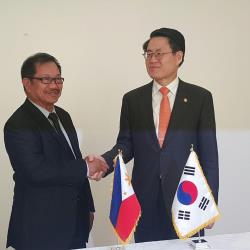



PH, ROK FARM MINISTERS DISCUSS AGRI-TRADE, MARKET ACCESS ISSUES
By: Embassy of the Republic of the Philippines, Seoul
SEOUL, 21 February 2017 - The agriculture ministers of the Philippines and the Republic of Korea met in Seoul on Tuesday, 21 February 2017 to discuss a number of pending concerns between the two countries, including trade in agricultural goods, market access, and bilateral technical cooperation.

Philippine Agriculture Secretary Emmanuel F. Pinol shakes hands with his Korean counterpart, Minister Kim Jae-soo of the Ministry of Agriculture, Food and Rural Affairs (MAFRA), after the PH-ROK Bilateral Meeting in Agriculture held on 21 February 2017 at President Hotel in downtown Seoul.
Secretary Pinol flagged the Philippines' interest to negotiate the lowering of Korean tariffs for fresh tropical fruits from the Philippines, especially banana. Despite ongoing challenges, the Philippines remains the biggest source and preferred supplier of bananas for the Korean market.
Ecuador and other South American banana-producing countries are competing with the Philippines by negotiating or concluding free trade agreements with Korea.
MAFRA Minister Kim also said that they will consider the accreditation of non-traditional Philippine exports like yellow corn, okra and avocados. He said these products must be of good quality and priced competitively to be able to gain access to the South Korean market.
Aside from crops, Secretary Pinol also requested for the MAFRA to facilitate the ongoing Import Risk Analysis for the Philippine egg and dressed duck exports to South Korea. Following the outbreak of new strains of avian influenza, the South Korean government ordered the culling of about 30 million chicken causing a shortage in the supply of eggs, chicken and ducks.
The MAFRA Minister also asked that the entry into the Philippines of South Korean strawberries be allowed as there is huge demand for it from its nationals living in the Philippines.
To further enhance bilateral cooperation, the Department of Agriculture (DA) proposed for the very first PH-ROK MOU on Agriculture with MAFRA.
Secretary Pinol also met with Chairman Kim Byeong-won and officials of the National Agricultural Cooperative Federation (Nonghyup-NACF), who affirmed their intention to collaborate with the Philippines on strengthening farmers' cooperatives and improving extension of support to farmers and fishermen.
Secretary Pinol also met with DOLE Asia Ltd and DOLE Korea to discuss some concerns about the Korean market, as well investment opportunities for DOLE'S expansion of production base in Mindanao, and the need for the government to negotiate for lowering the tariffs to maintain competitiveness of the Philippine farm sector.
He concluded his official visit in Seoul with a call on Ambassador Hernandez at the Philippine Embassy, a brief meet-and-greet with officers and staff at the Embassy's Rizal Hall and the first visit ever by a sitting agriculture secretary to the Philippine Agriculture Office (PAO) since its establishment in January 2016.
Secretary Pinol's visit underscores the Philippines' seriousness to engage and strengthen its bilateral relations with Korea, which is one of the leading food importers in the world. As such it posts great potential for Philippines' new exports of feeds (yellow corn and silage), eggs and duck meat, calamondin (calamansi), pomelo, avocado and other tropical fruits, and natural healthy foods.
Korea's successful experiences in modernizing its agriculture and rural sector and technological breakthroughs and direct farm credit programs pose great opportunity for our Filipino agriculture stakeholders to learn from.
- END-



